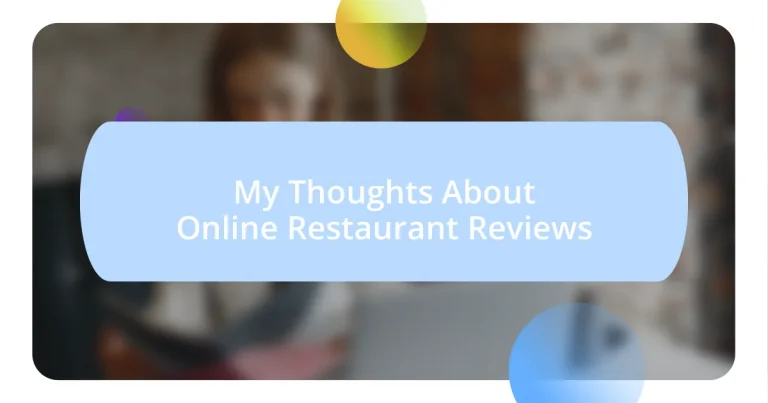Key takeaways:
- Online restaurant reviews deeply influence dining choices through emotional connections, peer recommendations, and vivid descriptions, shaping consumer anticipation.
- Crafting effective reviews requires honesty, detail, and context about personal experiences to help others make informed decisions.
- Evaluating reviews involves questioning their credibility, recognizing the balance of opinions, and looking for consistency to discern genuine dining experiences.

Understanding Online Restaurant Reviews
Understanding online restaurant reviews can be a bit like navigating a maze filled with opinions. I remember a time when I was torn between two dining choices, and the reviews for one place were overwhelmingly positive while the other had a mixed bag. It’s fascinating how just a few paragraphs can influence where we decide to eat, isn’t it?
When I dive into these reviews, I often look for genuine experiences rather than just star ratings. For instance, a heartfelt story about a birthday celebration at a particular restaurant resonated with me. It made me consider not only the food, but also the atmosphere and emotional connections people form in these spaces. Have you ever felt moved by a review that made you excited to try a new place?
The language used in reviews can tell you so much about a restaurant’s vibe. I’ve noticed that vivid descriptions, like “the aroma wafting through the air,” transport me right to the table. It’s important to decipher whether a review captures the essence of a dining experience or if it’s just fluff. By honing in on the details, I find I can make better dining choices that suit my tastes and expectations.

Importance of Restaurant Reviews
Restaurant reviews hold significant value in today’s dining landscape. They serve as a bridge between potential diners and the culinary experiences awaiting them. I vividly recall a time when I was skeptical about trying a new eatery, but after reading a review that described the chef’s passion for local ingredients, I felt compelled to give it a shot. Experiencing that delightful meal reminded me just how influential these shared stories can be.
Consider the following reasons why restaurant reviews matter:
- Guidance in Decision-Making: Reviews help narrow down choices in a crowded dining scene.
- Community Building: They foster a sense of community among food lovers who share their experiences.
- Feedback Loop: Constructive criticism can push restaurants to improve and innovate.
- Authenticity Factor: Real customer insights create a trustworthy image of a restaurant’s quality.
- Trend Spotting: Reviews can highlight emerging dining trends we might not otherwise notice.
Each review encapsulates emotions and memories, transforming a simple dining decision into a shared experience filled with anticipation and excitement. This collective wisdom allows us to explore new cuisines with confidence.

How Reviews Influence Consumer Choices
When I read restaurant reviews, I often notice how they subtly weave personal narratives that sway my decision-making. For example, I once stumbled across a review where someone shared their experience of enjoying a late-night dessert after a tough day. The way they described savoring the decadent chocolate cake while the lights dimmed gave me an emotional connection. I couldn’t help but imagine how comforting that moment must have felt, compelling me to seek out that very restaurant.
Additionally, I’ve often found myself doing an informal poll among friends regarding their favorite spots. The weight of their recommendations, combined with online reviews, creates a powerful synergy that shapes my dining choices. I remember a time when my friends unanimously raved about a hidden gem with incredible vegan tacos. Their enthusiasm, combined with rave reviews that highlighted the freshness and vibrant flavors, made it impossible for me to resist.
While star ratings give a quick snapshot, it’s the detailed reviews that echo in my mind long after I read them. I’ve noticed that when a few thoughtful words stand out—”unforgettable,” “flavor explosion,” or “like being transported to Italy”—they linger, guiding my decisions for days or even weeks. Isn’t it fascinating how a simple string of words can build excitement and anticipation for a meal?
| Factor | Influence on Consumer Choices |
|---|---|
| Emotional Connection | Personal stories in reviews create a bond and anticipation for a dining experience. |
| Peer Recommendations | Trusting friends’ suggestions alongside reviews reinforces the credibility of a restaurant’s offerings. |
| Descriptive Language | Engaging adjectives and phrases make a dining experience more appealing and relatable. |

Best Practices for Writing Reviews
When crafting a restaurant review, it’s essential to strike the right balance between detail and clarity. I’ve found that sharing specific dishes I tried, along with what I loved or didn’t love about them, adds depth to my feedback. For instance, while discussing a recent Italian bistro visit, I focused on the creamy risotto, describing how the saffron infused every bite with warmth, which helps readers visualize the flavors.
One effective way to enhance your review is by including context about your experience. I remember dining at a bustling pizzeria during a lively festival, where the atmosphere was just as impactful as the food. Mentioning how the vibrant energy around me amplified the enjoyment of my pepperoni slice made the review more relatable. Aren’t those moments in dining experiences what we remember most?
Lastly, honesty is paramount. Whether a dish fell flat or exceeded expectations, being truthful ensures readers trust your opinion. I once wrote a review detailing a lovely meal overshadowed by slow service. By including both the delightful flavors and the service struggles, my review offered a balanced perspective that others found valuable. After all, isn’t it our responsibility to share the whole experience?

Evaluating the Credibility of Reviews
Evaluating the credibility of online restaurant reviews can feel like navigating a maze. I remember when I was planning a special birthday dinner, and I came across a review that sounded off. The reviewer raved about a dish I knew the restaurant didn’t even offer. It made me question the authenticity of not just that review, but the entire review system for that restaurant. How can one truly trust reviews if they don’t align with the reality of the menu?
Another key consideration is the balance of positive and negative reviews. I recall being intrigued by a highly-rated restaurant, only to find a significant number of critical remarks about the service. It was a real eye-opener for me. Understanding that many reviews can be polarized helps me approach them with a critical mind. Are the positive reviews reflective of genuine experiences, or are they just noise drowning out valid concerns?
Lastly, I’ve learned the importance of looking for consistency in reviews. On one occasion, I found a charming café that consistently received praise for its ambiance but mixed feedback on the food. I decided to visit, and while the atmosphere was delightful, my meal wasn’t what I’d hoped for. This taught me that even quality experiences can vary greatly. Thus, I now pay attention not just to individual reviews but to trends among multiple opinions. After all, how much can we rely on a single voice in such a diverse chorus?

Common Misconceptions About Reviews
It’s a common misconception that all reviews are entirely trustworthy, but I’ve learned that this isn’t always the case. I vividly recall an experience when I excitedly picked a restaurant based on glowing recommendations, only to be disappointed by a dish that was nothing like described. It left me wondering, how much weight should we really give to a single enthusiastic review?
Another prevalent myth is that a high volume of reviews guarantees quality. I once visited a trendy spot that boasted hundreds of five-star ratings. However, upon tasting my meal, I found it far from exceptional. This experience taught me that sometimes, popularity is more about good marketing than culinary excellence. Isn’t it frustrating to realize that sometimes the most popular places might not be the most rewarding in terms of food?
Additionally, many people believe that only negative reviews are helpful. I remember coming across a scathing critique that almost stopped me from trying a place I ended up loving. It dawned on me that even negative feedback can highlight unique elements worth considering. So, instead of dismissing them, I now appreciate how a bad review might reveal a restaurant’s quirks or even strengths that resonate differently with various diners. Does the beauty of dining not lie in its subjectivity?












